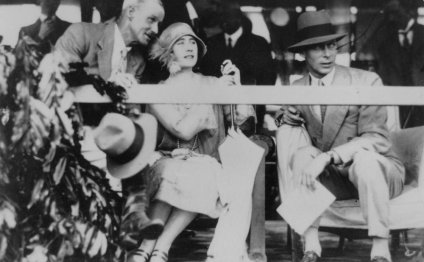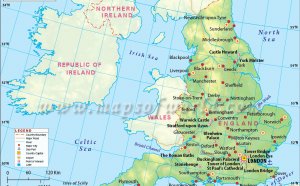
Where is the Queen Mum buried?
 The Duke did not heed that advice. Bitterness came easily to him and, since he had nothing to do, he had time to mull it all over. Years later, he told the biographer Kenneth Rose: 'Twenty years I worked for my country and they kicked me out on my ass.'
The Duke did not heed that advice. Bitterness came easily to him and, since he had nothing to do, he had time to mull it all over. Years later, he told the biographer Kenneth Rose: 'Twenty years I worked for my country and they kicked me out on my ass.'
The social historian Cleveland Amory, who helped ghost the Windsors' autobiographies, wrote: 'Almost every conversation I had with the Duke would have at least one time in it the preface, "When I was King", and then a story about that.
'As for the Duchess, she did not know the first thing about the British government, nor indeed about the British people. All she knew was how to get a man and how to get ahead.'
This begs the question: how did she get 'her man'? Every possible theory has been advanced. It was even suggested that Wallis had learnt special sexual techniques in Shanghai, where she had gone in 1924 to try to patch up her marriage to her first husband Win Spencer.
Feud: Queen Elizabeth told the Duke when he abdicated that she would always remember him in her prayers, though she soon became irritated by his demands
The attitude of King George VI and the Royal Family towards the Duke following the Abdication was something he found hard to come to terms with and arguably never forgave.
Like so many other elements in the lives of the Duke and Duchess, their wedding in 1937 was rife with problems. The King decided that no member of the Royal Family would attend the ceremony.
From that day on, the Duke lay in wait for slights and succeeded in finding them at every turn.
Moreover, Wallis was not given the right to be a Royal Highness or a member of the British Royal Family. The title of Royal Highness was to be restricted to the Duke alone.
The Duke minded this more than Wallis did and insisted that his staff call her 'Your Royal Highness' at all times. For the rest of his life the Duke appealed over and over again to have this decision reversed.
 It became a major preoccupation - along with his wish that the Duchess be received by the King and Queen, and for this meeting to be recorded in the Court Circular.
It became a major preoccupation - along with his wish that the Duchess be received by the King and Queen, and for this meeting to be recorded in the Court Circular.
In practice, the Royal Family could do as they pleased. They took steps to prevent the Duchess becoming a Royal Highness partly out of fear that the marriage would not last. At the time it was said that they did not want divorced Royal Highnesses 'floating around the cafes of Budapest'.
The Duke continued to demand the right to return to Britain from France, where they had settled, but the new King, his brother George VI, was advised that the Windsors must not come back.
Once with his wife and her cafe society world, the Duke found his own family more antiquated and distant than ever
This would be another issue to dog them for the rest of their lives. The Duke was alarmed to find that if he arrived in Britain without obtaining the King's permission, private financial arrangements made for him by his brother could be cancelled.
The Windsors were at Cap d'Antibes in the South of France when the Second World War broke out, and the Duke agreed to return to Britain without insisting on terms.
He had one lone meeting with King George VI, at which various options were discussed concerning his future in wartime.
A year after war was declared, Churchill accused the Duke of disobeying military orders, hinted at the threat of court martial, left him to stew overnight and then sent him a telegram informing him that it was in his power to offer him the Governorship of the Bahamas.
Nobody was excited about the appointment: the Duke and Duchess considered it another form of exile while Queen Elizabeth attempted to quash the appointment on account of the Duchess.
Such attitudes clearly wounded Wallis. Towards the end of the war, she complained to a friend: 'I can't see why they don't just forget all about the Windsors and let us be where we want to be - in obscurity.'
There is no evidence that Wallis consciously tried to isolate the Duke of Windsor from his family, but she was acutely aware of their unwillingness to accept her.
 Rare encounter: The Queen and Prince Charles with the Duchess of Windsor in Paris in 1972 shortly before the Duke died
Rare encounter: The Queen and Prince Charles with the Duchess of Windsor in Paris in 1972 shortly before the Duke died
Once with his wife and her cafe society world, the Duke found his own family more antiquated and distant than ever.
Queen Mary, the Duke's mother, confined her contact with him to letters. His decision to abandon the throne and the title of Edward VIII was, in her view, made when his mind was absolutely unhinged.
She was devoted to her eldest son, but could not accept his wish to put the path of personal happiness with Wallis before his duty.
This was best summed up in her remark to him: 'It seemed inconceivable to those who had made such sacrifices during the war that you, as their King, refused a lesser sacrifice.'
As the years went by, the Duke of Windsor rejigged his version of history. He attributed the Abdication to an Establishment plot and began to believe that Elizabeth Bowes-Lyon, the new Queen, had led a campaign against him. In fact, she played no part in the Abdication.
Many have insisted that she did not hate Wallis Simpson and simply wanted peace, while others enjoyed the idea of a feud. Certainly, as the new Queen Elizabeth and later the Queen Mother, she kept her distance.
The women presented contrasting styles. Elizabeth was sensibly dressed, wholesome and loyal. Stylish and sharp, Wallis had a vaguely raffish edge.
That suspicion extended to the Duke. There remained a fear within the aristocracy that he might attempt to reclaim his birthright, that his charisma was a threat to the new King and that he could now no longer be trusted.
Wallis knew that few would put flowers on her grave
Nevertheless, Queen Elizabeth told the Duke when he abdicated that she would always remember him in her prayers, though she soon became irritated by his demands.
Years later, she told Henry Gillespie, a friend from Australia: 'The two people who have caused me the most trouble in my life are Wallis Simpson and Hitler.'
It was her view that the Windsors should be discouraged from re-entering Royal circles. In 1939 she made it known that she had no wish to meet the Duchess of Windsor. If she did, she believed, it would be no time before the pair would be wriggling their way into court functions.
The slights continued. On returning to Europe from the Bahamas after the war, the Duke was irritated that neither he nor the Duchess was received at Buckingham Palace, the accepted practice for every colonial Governor and his wife.
The question of what the Duke might do next had been raised in London. Tommy Lascelles, the King's Private Secretary, told the Prime Minister's office that nothing had given him so much worry over a quarter of a century as the problems associated with the Duke of Windsor.
Lascelles did not want him in England and made the devastating point that it would be 'a constant agony (I use the word advisedly) to the present King, which might have really serious consequences'. There would be no more official jobs.
Meeting a monster: The Windsors' ill-advised trip to Berlin in October 1937 to see Hitler can hardly have helped family relations
In February 1952, George VI died and the Duke came to London alone for the funeral. If he had hoped that the new reign would make his life easier, he was mistaken.
He soon discovered, for example, that he had lost his allowance of £10, 000 a year, a voluntary sum given him by his brother. The Duke was shocked at this and claimed he would have to adjust his standard of living while trying to live as befitted the son of an English sovereign.
Video on topic: Where is the Queen Mum buried?


Share this Post
Related posts
Where is the Windsor Castle?
It was William the Conqueror who first chose the site for Windsor Castle, high above the river Thames and on the edge of…
Read MoreWhere is the Windsor Castle located?
Windsor Castle, England – The magnificent 900-year-old Windsor Castle is the official residence of the Queen and the world’s…
Read More










